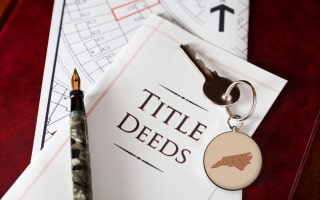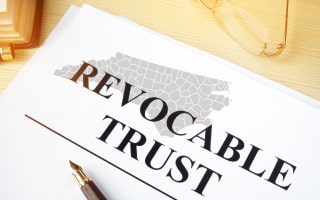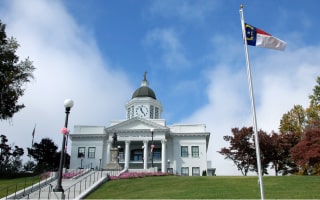How to Find Owners of Properties
in North Carolina

North Carolina public records make it easy for anyone to find a property owner by address, name, or any other identifier. But, while accessible, public records can sometimes be hard to interpret.
Fortunately, there are third-party services that can help with a North Carolina house owner lookup and interpret the search results for a small fee.
Here are some basic ways to carry out a property owner search in North Carolina.
Check the Registry of Deeds
Each county in North Carolina maintains public records of properties and other important documents in that region. The Registry of Deeds is a storage facility for all public records, like deeds, birth records, powers of attorney, etc., safeguarding them and making them available for interested individuals upon request.
The North Carolina Registry of Deeds Association has a database with links to all Registry of Deeds offices in the state. From the drop-down menu, you can click on any county within the state and submit to find the current Registry of Deeds, their office address, and contact information.
These offices are typically open for a physical search on weekdays and during work hours of 8:00 a.m. to 4:30 p.m. You only need to provide the property owner's name and relevant dates to start this search.
Below are the websites of the Registry of Deeds for some counties in North Carolina:
Search with the North Carolina Land Records Website
The North Carolina Secretary of State has a Lands Records Management system that allows users to search property by date, annexation, and municipality. To search this platform, simply visit the database, click on the applicable search criteria, and fill out the blank information, like start and end dates, to narrow your search.
Visit the County Assessor's Office
Another way to find property owner by address in North Carolina is by visiting the County Assessor's office where the property is located. The assessor conducts valuations on all properties in their areas of coverage and keeps records of these properties to enable interested persons to conduct verifications at will.
The North Carolina Department of Revenue has a detailed list of all County Assessor offices in the state. But here are some of the county assessor's websites in North Carolina:
To conduct a property search at these offices, you need only the owner's name or part of it, the property address, and the parcel number. Their offices are typically open between 8:00 a.m. and 5:00 p.m. for a walk-in search, while their websites run 24/7 for a seamless search.
Check Tax Records
At the local assessor's office, you can also request tax records of any property within that county to draw information from it. These property tax records show whether or not a property's taxes are updated or if there are debts attached to it. It also shows the current owner, property value, and overall tax value. Aside from visiting the local assessor's office in person, you can visit the specific county's website and search for its tax maps or real property records to find this information.
Use a Title Company/Agency
A title company can help carry the property search burden for an agreed fee. These companies have access to property records databases and can save you the time you would have spent moving from one government office to another. They also manage to arrange the search results in an easy-to-understand manner so you can easily comprehend them.
This service costs an average of $350, depending on the specific company. However, as a cheaper alternative, you can visit the property location and speak to neighbors, ask local real estate agents and attorneys, or check with real estate websites that allow users to find the property records in North Carolina.
![]() Try Commercial Services
Try Commercial Services
Commercial third-party services are an alternative to conducting a property search yourself. While not as detailed or comprehensive as a standard North Carolina house owner lookup from government offices or databases, they offer speed and accurate information in a shorter time.
PropertyChecker is one of the many third-party services allowing users to conduct a property owner search in North Carolina. Their platform offers access to statewide records and information on both present and past title holders and even reveals the identities of the persons behind LLCs, trusts, and other private entities.
Here are some simple steps to search their database:
- Visit the PropertyChecker website.
- Enter any of the following search criteria: the property address, the owner's name, phone number, email, or parcel ID.
- Click the search button to trigger a search through more than 155 million properties on the platform.
- From the displayed results, pick the one that matches your search criteria.
What Are the Different Types of Property Ownership in North Carolina?

A person can own property alone or with others, like their spouse, other family members, and friends. As a result, different types of property ownership apply in various states, including North Carolina.
Understanding the different types of property ownership and their legal implications can help you make informed decisions. It is also important to understand how choosing the right property structure can affect your risk, liabilities, taxes, and more.
In North Carolina, the most common types of property ownership are:
- Sole Ownership
- Joint Tenancy
- Tenancy in Common
- Tenancy by Entirety
Below is a breakdown of how each works, their benefits, and legal implications:
| Ownership Title | Description | Benefits | Implication |
|---|---|---|---|
| Sole Ownership | One person has the legal title to a property. | It allows the sole owner to make decisions without deferring to anyone. | The sole owner bears all risks and losses. |
| Joint Tenancy | This arrangement allows two or more persons to own property together. | Reduced risk, as joint owners can split the liability equally among themselves. | If one tenant dies, their share of the property goes to the other tenant(s), not their family members. |
| Tenants by Entirety | This ownership allows married couples or domestic partners to own property together, not in shares, but jointly (100% and not 50:50) | Upon the death of a spouse, the title transfers to the other owner without probate. | Both parties must consent to any sale or develop the property. |
| Community Property | Community property defines how a couple owns the properties they acquire while married. Their stake is typically 50% each. | There is less tussle during a divorce since the stakes are clear. | The community ownership ends once a spouse dies, and the living spouse inherits the residue. |
| Tenancy in Common | A form of shared ownership, allowing persons to jointly own property together. | Owners can determine what percentage each person has and what risks they should each carry. | There is no right of survivorship here. Once a tenant dies, their beneficiaries inherit their share of the property. |
| Condominium Ownership | This allows a person to own a share in a building complex but share common amenities with other owners. | Condos are a cheaper way to own property since they cost less than regular residential properties. | Apart from the initial cost of purchase, condo owners still pay regular maintenance fees. |
| Cooperative Ownership | Here, individuals own shares in a corporation that owns a property. | This type of ownership is much cheaper than outright individual ownership. | Residents are not owners but shareholders in the company that owns the property. |
| Trust Ownership | Under this arrangement, a trust oversees a property on behalf of a third party, the beneficiary. | This is one of the property types best for avoiding probate. | Assets held in a trust are safe from lawsuits, creditors, and heavy taxes. |
| Life Estate | This is a type of property ownership in which a person gives their property to another, but the recipient does not get full ownership until the giver's death. | Properties under a life estate can bypass probate. | It saves time and money in court fees. |
Finding the Owner of a Trust or Corporation that Owns Properties in North Carolina

Individuals are not the only entities who can own properties in North Carolina. Registered limited liability companies, trusts, C or S corporations, and partnerships are other non-human entities that can also own property. However, their type of ownership is unique because when you conduct a North Carolina house lookup on a property with one of these entities as the owner, your search results may pull up just the company's name and not the persons behind it.
As a result, it may be best to get professional assistance from a real estate company or title company to find the actual owners. However, it is also possible to search yourself by cross-referencing public records like deeds, mortgages, and property tax records as normal. You can also search through business databases like LexisNexis, Westlaw, or other business research tools. Some counties may also have local business directories containing information on all businesses in their area. This is another area to direct the search.
Here's how to start this type of search in North Carolina:
Finding the Owner of a Trust in North Carolina
In North Carolina, trusts are generally not public records because, by nature, their contents are private. However, depending on the circumstances, it is possible to start a search with the County Clerk's office at the Superior Court. Note that this may only apply if there is a pending lawsuit with the trust involved. The court may not be willing to provide the information for a random property owner search in North Carolina.
Alternatively, you can consult with a real estate attorney to analyze the trust documents and see if there are any ties to the trustees or other beneficiaries.
Finding the Owner of an LLC in North Carolina
North Carolina has a business registration database where interested persons can find information on any registered entity in the state. Here's how to use the database:
- Visit the business registration database.
- Next, select one of the provided options to narrow down the search to a company, registered agents, company officials, or assumed business names.
- In the next column, provide how you want to search. There are three options: "starting with", "Exact", and with a SoSID. The "starting with" is the best option here, as it will display all companies with the specific prefix if you cannot remember the exact business name.
- But, if you have the correct business name, enter it in the next column tagged "Searching for" to narrow down your search.
- Once done, click search and choose the relevant business name from the result page.
Finding the Owner of a Corporation in North Carolina
Finding the owner of a corporation follows the same procedure as a regular company or business search in North Carolina. As mentioned above, visit the Secretary of State's business search database. Then, click your preferred search criteria if you want to search using the name of the corporation, its founders, or other officials.
Alternatively, you can use the Department of Commerce's search tool, which has a quick search option, allowing users to find companies by their name and industry. If this doesn't work, you can do an advanced search, enabling you to search specific areas, number of employees, and company status, private or public.
Common Methods of Property Transfer in North Carolina

Property deeds are the legal documents evidencing the transfer of title from a property owner to a buyer or other recipient of the property title. It describes the property in question and contains information on the parties involved in the transaction. The most common types of property deeds in North Carolina include:
-
Warranty Deeds: This deed is of two types, general and special warranty deed. Under the general warranty, the seller undertakes to protect the buyer from any claims or issues that may arise from title defects or any other issues relating to the property. Through it, the seller also assures the buyer that they are the genuine owner of the property and have the right to sell. A special warranty, on the other hand, is a limited warranty because, through it, the seller only promises to protect the buyer from any title issues arising from the time they owned the property.
-
Quitclaim Deeds: This deed does not protect the buyer in any way nor guarantee that the seller's title is genuine. It is a basic property deed that typically applies where the recipient is not likely to contest the title or pay anything in exchange for the property. For example, parents passing property to their children or a property exchange between spouses.
-
Deed of Trust: This type of deed is common with real estate transactions or whenever a person uses their property as security for a loan. Here, a trustee holds the property title until the buyer pays off the mortgage or the borrower repays their loan. Upon failure to redeem the loan or pay the mortgage, the seller has the right to foreclose and sell the property to someone else without a court order.
Other types of deeds are:
- Grant Deeds
- Bargain and Sales Deed
- Mortgage Deed
Step-by-Step Guide to Property Transfer in North Carolina

After buying a property in North Carolina, you must still take other necessary steps to protect yourself from surprise claims and future liens. So, it is crucial to understand all legal and administrative processes so that you can ensure that you are well-protected:
- Determine the type of Property Transfer: Understanding the type of property transfer involved will help you determine the type of deed to prepare and other legal requirements related to that type of transfer. For example, if the transfer is via a sale, it would require stricter legal processes than if it were to be a gift from a loved one.
- Title Search: A simple property owner search in North Carolina or a North Carolina house owner lookup can verify that the seller has a valid claim to the property in question and can transfer the title free of any encumbrances. It typically costs around $100 and $250 for residential searches and around $300 for commercial searches.
- Preparation of the Deed: After verifying the title, hire an attorney to prepare a deed as evidence of the transaction and outline all its terms. Attorneys charge an average of $400 to $1000 to prepare these deeds in North Carolina, depending on the law firm and other influencing factors like the complexity of the transaction.
- Paying Transfer Taxes: North Carolina's real estate laws mandate sellers to pay $1 on every $500 made in property transfer transactions as a transfer tax. In some counties like Camden, Chowan, and Currituck, the sellers must pay an extra 1% as local excise tax.
- Recording the Deed: Property owners in North Carolina are mandated to file new property deeds with the register of deeds in the county where the property is located before any transfer of title may be declared official.
- Review and Recording: After completing a property transfer, the new owner must apply to record the deed at the Registry of Deeds office. Upon receiving the application, the register's office analyzes it to ensure its information is accurate and genuine. If approved, the owner will then pay a filing fee, which is usually $26 for the first 15 pages and $4 for every page after that.
- Receipt of Recorded Deed: Following payment of the applicable filing fees, the relevant office will issue a receipt as evidence of recording the deed.
- Updating Records: After completing the other steps, it is best to apply to other relevant agencies to notify them of the change of ownership and update their records. This ensures that the new owner receives all bills and mail relating to the property.
- Title Insurance Policy Issuance: Title insurance costs around 0.5 to 1% of the sales price in North Carolina. It helps protect the property owner from scams, property-related fraud, and other liens that may arise in the future. While this is not compulsory, it is an advisable best practice.
Property Ownership Guide
- How to Find Owners of Properties in North Carolina
- What Are the Different Types of Property Ownership in North Carolina?
- Finding the Owner of a Trust or Corporation that Owns Properties in North Carolina
- Common Methods of Property Transfer in North Carolina
- Step-by-Step Guide to Property Transfer in North Carolina
North Carolina Homeowner Lookup
- Owner(s)
- Deed Records
- Loans & Liens
- Values
- Taxes
- Building Permits
- Purchase History
- Property Details
- And More!
Property Ownership Guide
- How to Find Owners of Properties in North Carolina
- What Are the Different Types of Property Ownership in North Carolina?
- Finding the Owner of a Trust or Corporation that Owns Properties in North Carolina
- Common Methods of Property Transfer in North Carolina
- Step-by-Step Guide to Property Transfer in North Carolina